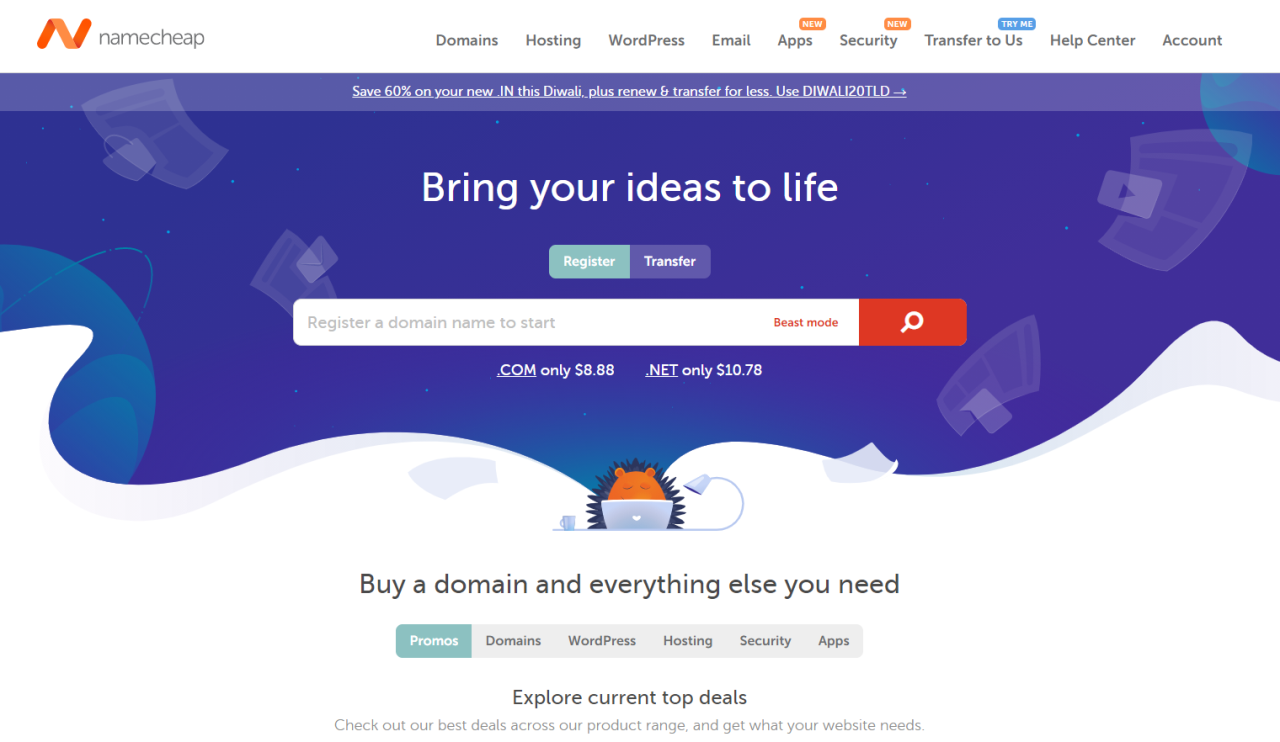Getting a website domain is the first step to establishing your online presence. It’s your unique address on the internet, like a street address for your website. Think of it as your virtual storefront, where potential customers and visitors can find you.
Choosing the right domain name is crucial, as it will be the foundation of your brand and online identity. It needs to be memorable, relevant to your content, and easy to type. This guide will walk you through the process of selecting, registering, and managing your domain name, ensuring you have a solid foundation for your online success.
Understanding Domain Names
In the digital world, domain names are the addresses of websites, making them crucial for online presence and accessibility. They act as user-friendly labels that translate complex IP addresses into recognizable names, simplifying navigation for users.
Types of Domain Names
Domain names are categorized based on their top-level domains (TLDs), which are the suffixes following the dot (.) in a domain name. Different TLDs are associated with specific purposes and organizations.
- .com: The most common TLD, widely used for commercial websites, businesses, and organizations.
- .org: Primarily used for non-profit organizations, charities, and associations.
- .net: Originally intended for network service providers, but now widely used for various purposes.
- .edu: Exclusively reserved for educational institutions, such as universities and colleges.
- .gov: Reserved for government websites and agencies.
Examples of Well-Known Domain Names
Here are some well-known domain names and their effectiveness:
- Google.com: A simple, memorable, and highly effective domain name that reflects the company’s core service: search.
- Amazon.com: This domain name effectively communicates the company’s focus on online retail and e-commerce.
- Facebook.com: This domain name clearly conveys the platform’s purpose of connecting people and fostering social interaction.
“A good domain name is short, memorable, and relevant to your website’s content.”
Choosing the Right Domain Name

Choosing the right domain name is crucial for your website’s success. A well-chosen domain name can attract visitors, build brand recognition, and enhance your online presence. It’s a key decision that should be made with careful consideration.
Factors to Consider
Several factors influence the effectiveness of a domain name. Here are some key considerations:
- Relevance: The domain name should be relevant to your website’s content and target audience. For example, if you run a bakery, a domain name like “deliciousbakery.com” would be more relevant than “abc123.com”.
- Memorability: A memorable domain name is easy to remember and spell. Short, catchy, and unique names tend to be more memorable. Avoid using hyphens or numbers, as they can make the name harder to recall.
- Availability: Before you get too attached to a domain name, check if it’s available. Many popular names are already taken, so you might need to be creative or consider alternative extensions.
Brainstorming Domain Name Ideas
Generating domain name ideas can be a fun and challenging process. Here’s a step-by-step guide:
- Start with s: Identify the main s related to your website’s content. For example, if you sell handmade jewelry, your s might be “handmade,” “jewelry,” “accessories,” and “gifts.”
- Combine s: Create combinations of your s to form potential domain names. For example, you could combine “handmade” and “jewelry” to get “handmadejewelry.com” or “jewelryhandmade.com”.
- Get creative: Don’t be afraid to think outside the box. Use puns, acronyms, or even your own name to come up with unique and memorable domain names.
- Check availability: Once you have a few promising ideas, check if the domain names are available. You can use domain registrars like GoDaddy or Namecheap to search for available domains.
Domain Name Extensions, Getting a website domain
The domain name extension, also known as the top-level domain (TLD), comes after the dot (.) in your domain name. It indicates the type of organization or location of your website. Different extensions have their own advantages and disadvantages.
| Extension | Advantages | Disadvantages |
|---|---|---|
| .com | Most popular and widely recognized extension, often associated with commercial websites | Can be expensive and difficult to obtain if the desired name is already taken |
| .net | Traditionally used for network-related websites, but now widely used for various purposes | May not be as widely recognized as .com |
| .org | Used for non-profit organizations, but now used by various websites | May not be as widely recognized as .com |
| .info | Used for informational websites, but now used by various websites | May not be as widely recognized as .com |
| .co | Short and memorable, often used for companies or businesses | May not be as widely recognized as .com |
Domain Name Management and Maintenance
Just like owning a physical property, owning a domain name requires ongoing management and maintenance to ensure its security, functionality, and availability. This involves tasks such as renewal, privacy settings, DNS record updates, and security measures to protect your domain from hijacking or theft.
Domain Name Renewal
Domain names are not permanent possessions; they need to be renewed periodically to maintain ownership. The renewal period varies depending on the registrar and the top-level domain (TLD), but it’s typically one to two years. Failing to renew your domain name could result in its expiration, potentially leading to its being acquired by someone else.
To avoid losing your domain, set up automatic renewal with your registrar. This ensures that your domain name is automatically renewed before its expiration date. You can also set reminders for upcoming renewals to stay proactive in managing your domain.
Privacy Settings
Domain registrars typically collect and publicly display the contact information of domain name owners, known as WHOIS records. This information can be used for marketing purposes, spam, or even malicious activities.
To protect your personal information, consider enabling domain privacy settings. This feature replaces your contact information with the registrar’s contact details, safeguarding your privacy. However, it’s important to note that domain privacy settings may not completely prevent access to your information, as law enforcement or legal proceedings may still allow access to your details.
DNS Record Management
Domain Name System (DNS) records are crucial for translating domain names into IP addresses, enabling internet users to access websites. These records manage various aspects of your domain, such as email routing, website hosting, and redirection.
Updating DNS Records
Updating DNS records is essential when making changes to your website or email configuration. For example, if you switch web hosting providers, you need to update the DNS records to point your domain name to the new server. Updating DNS records can take up to 48 hours to propagate globally.
Domain Name Forwarding
Domain name forwarding allows you to redirect visitors from one domain name to another. This is useful for various scenarios, such as:
- Redirecting an old domain name to a new website.
- Creating a shorter or more memorable domain name that redirects to your main website.
- Forwarding traffic to different websites based on the visitor’s location.
Domain Name Security
Domain name security is crucial to prevent hijacking or theft, which can result in significant financial and reputational damage.
Securing Your Domain Name
Here are some key steps to secure your domain name:
- Choose a Strong Password: Use a strong, unique password for your registrar account and enable two-factor authentication for added security.
- Enable Domain Lock: This feature prevents unauthorized transfers of your domain name to another registrar.
- Monitor WHOIS Records: Regularly check your WHOIS records to ensure they are accurate and haven’t been tampered with.
- Use a Secure Registrar: Choose a reputable registrar with a proven track record of security and customer support.
Domain Name Strategies
Choosing the right domain name is only the first step. Once you have a domain name, you need to develop a strategy for using it. This strategy will depend on your goals for the website and your target audience.
Securing a website domain is the first step in establishing your online presence. You’ll need to decide on a memorable name and then register it. Once you have your domain, you can then consider tools like minitool partition to manage your hard drive space, ensuring you have enough room for your website files and other important data.
Having a well-organized and efficient system helps you focus on building a successful website.
Brand Building
A strong domain name can be a valuable asset for building a brand. A memorable and relevant domain name can help you to stand out from the competition and build trust with your customers.
- For example, the domain name amazon.com is instantly recognizable and associated with the company’s brand.
- Similarly, google.com is synonymous with search and has become a household name.
Optimization
Domain names can also play a role in optimization. By including relevant s in your domain name, you can improve your website’s ranking in search engine results pages (SERPs).
- For example, a website about might use a domain name like -services.com.
- This helps search engines understand the website’s content and improves its chances of ranking for relevant s.
Website Redirection
Domain names can also be used to redirect traffic to different websites. This can be useful for a variety of reasons, such as:
- Consolidating multiple websites: If you have several websites, you can use a single domain name to redirect traffic to all of them. This can make it easier for users to find your content and improve your website’s .
- Protecting your brand: You can register domain names that are similar to your brand name to prevent competitors from using them. This can help to protect your brand from infringement.
- Testing new ideas: You can use a new domain name to test out a new website or product before launching it on your main website.
Using Multiple Domain Names
Using multiple domain names can be a good strategy for some businesses. This can help you to:
- Target different audiences: You can use different domain names to target different audiences with different interests. For example, a company that sells both men’s and women’s clothing might use separate domain names for each gender.
- Promote different products or services: You can use different domain names to promote different products or services. For example, a company that offers both web design and services might use separate domain names for each service.
- Increase brand awareness: Using multiple domain names can help to increase brand awareness by reaching a wider audience.
However, there are also some risks associated with using multiple domain names. These include:
- Increased management costs: Managing multiple domain names can be time-consuming and expensive.
- Confusion for users: Users may be confused if they see multiple domain names associated with your brand. This can lead to a decrease in traffic to your website.
- challenges: Managing multiple domain names can create challenges for optimization. Search engines may not be able to crawl and index all of your websites effectively.
Domain Name Trends and Future Considerations: Getting A Website Domain

The landscape of domain names is constantly evolving, driven by technological advancements, changing user behavior, and emerging trends. Understanding these trends and their implications is crucial for businesses and individuals alike to navigate the digital world effectively.
The Rise of New Domain Extensions
The traditional .com domain has long dominated the internet, but recent years have witnessed a surge in the adoption of new top-level domains (TLDs). These new extensions, such as .app, .tech, .shop, and .online, offer more specific and relevant options for businesses and individuals. This diversification allows for greater branding flexibility and improved user experience. For instance, a technology company might choose a .tech domain to emphasize its specialization, while an online retailer might opt for a .shop domain to clearly indicate its purpose.
Closing Notes

Securing your website domain is a critical step in building a successful online presence. With careful planning, research, and a touch of creativity, you can choose a domain name that reflects your brand and resonates with your target audience. Remember, your domain name is your online identity, so choose wisely and make it memorable!


